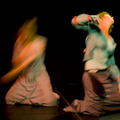First impressions and last impressions count a lot. I think I have come up with an ending that was absolutely unique and fabulous. Will not tell. Just yet. Really bad at keeping secrets.
But I will share some of the dramaturgical perls I have been coming up lately.
In Act III - Scene 2. Juliet has a very long monologue waiting for Romeo, that I have transformed. This is the original text:
Gallop apace, you fiery-footed steeds,
Towards Phoebus' lodging: such a wagoner
As Phaethon would whip you to the west,
And bring in cloudy night immediately.
Spread thy close curtain, love-performing night,
That runaway's eyes may wink and Romeo
Leap to these arms, untalk'd of and unseen.
Lovers can see to do their amorous rites
By their own beauties; or, if love be blind,
It best agrees with night. Come, civil night,
Thou sober-suited matron, all in black,
And learn me how to lose a winning match,
Play'd for a pair of stainless maidenhoods:
Hood my unmann'd blood, bating in my cheeks,
With thy black mantle; till strange love, grown bold,
Think true love acted simple modesty.
Come, night; come, Romeo; come, thou day in night;
For thou wilt lie upon the wings of night
Whiter than new snow on a raven's back.
Come, gentle night, come, loving, black-brow'd night,
Give me my Romeo; and, when he shall die,
Take him and cut him out in little stars,
And he will make the face of heaven so fine
That all the world will be in love with night
And pay no worship to the garish sun.
O, I have bought the mansion of a love,
But not possess'd it, and, though I am sold,
Not yet enjoy'd: so tedious is this day
As is the night before some festival
To an impatient child that hath new robes
And may not wear them.
I didnt simply just want to edit it, so it is shorter, but I always felt that this scene should be like a ritual, as if she was enchanting her bedroom like a witch. I wanted it to sound like a pagan prayer for love, or a bit like Hunagrian folk-poetry. Since the two languages work in different ways I have achieved the desired effect with different lyrical methodes.
I highlighted the boldest changes:
Spread thy close curtain, love-performing night,
And bring in cloudy night immediately.
That runaway's eyes may wink and Romeo
Leap to these arms, untalk'd of and unseen.
Spread thy close curtain, love-performing night,
Lovers can see to do their amorous rites
By their own beauties;
Come, civil night thou sober-suited matron, all in black,
Hood my unmann'd blood, bating in my cheeks,
With thy black mantle;
Come, civil night thou sober-suited matron, all in black,
Till strange love, grown bold,
Think true love acted simple modesty.
Come, gentle night, come, loving, black-brow'd night,
And come, Romeo; my day in night;
For thou wilt lie upon the wings of night
Whiter than new snow on a raven's back.
Come, gentle night, come, loving, black-brow'd night,
And give me my Romeo!
And in Hungarian:
Robogjatok, parázs-patáju mének a
A napszekérrel napnyugat felé
Ó, bár Apollo ostorozna most
Hogy menten hullna ránk a sűrű éj
Kerítő éj bocsájtsd le kárpitod
Jöjj fátyolos matróna barna éj
Jöjj sötétpillájú édes éj
S vakítsd meg a napot ne lássa senki
Kitárt karomba hogy száll Romeo
Nem kell világ az éji áldozathoz
szerelmeseknek szépségük világít
Kerítő éj bocsájtsd le kárpitod
Jöjj fátyolos matróna barna éj
Jöjj sötétpillájú édes éj
Sötét lepleddel, hadd higgyem vakon
Hogy szűz erény a teljesült gyönyör
Jöjj éj, jöjj Romeo – én napom
Kerítő éj bocsájtsd le kárpitod
Jöjj fátyolos matróna barna éj
Jöjj sötétpillájú édes éj
És add nékem Romeomat!
Lovely of blasphemous? You decide...




